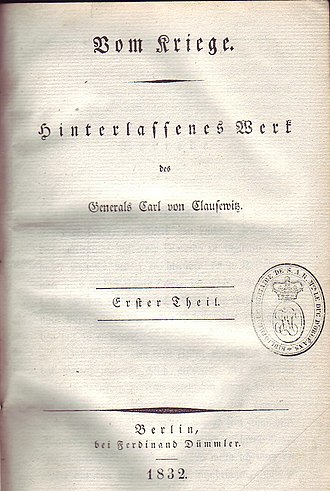
“… the “general message” of the book was that “the conduct of war could not be reduced to universal principles [and is] dominated by political decisions and moral forces.”[11][12] These basic conclusions are essential to Clausewitz’s theory:
- War must never be seen as having any purpose in itself but should be seen as a political instrument: “War is not merely a political act, but a real political instrument, a continuation of the political process, an application by other means.”[13]
- The military objectives in war that support one’s political objectives fall into two broad types: “war to achieve limited aims” and war to “disarm” the enemy: “to render [him] politically helpless or militarily impotent.”
- All else being equal, the course of war will tend to favor the party with the stronger emotional and political motivations, especially the defender.[1]
Some of the key ideas (not necessarily original to Clausewitz or even to his mentor, Gerhard von Scharnhorst) discussed in On War include[14] (in no particular order of importance):
- the dialectical approach to military analysis
- the methods of “critical analysis”
- the uses and abuses of historical studies
- the nature of the balance-of-power mechanism
- the relationship between political objectives and military objectives in war
- the asymmetrical relationship between attack and defense
- the nature of “military genius”
- the “fascinating trinity” (Wunderliche Dreifaltigkeit) of war
- philosophical distinctions between “absolute or ideal war,” and “real war”
- in “real war,” the distinctive poles of a) limited war and b) war to “render the enemy helpless”
- “war” belongs fundamentally to the social realm, rather than the realms of art or science
- “strategy” belongs primarily to the realm of art
- “tactics” belongs primarily to the realm of science
- the essential unpredictability of war
- simplicity: Everything is very simple in war, but the simplest thing is difficult. These difficulties accumulate[15]…The strength of any strategy lies in its simplicity.[16]
- the “fog of war“
- “friction”
- strategic and operational “centres of gravity“
- the “culminating point of the offensive”
- the “culminating point of victory”
Clausewitz used a dialectical method to construct his argument, which led to frequent modern misinterpretation because he explores various often-opposed ideas before he came to conclusions.”
Comment: This is the underlying bedrock of the study of war as a human phenomenon. It is written in heavy Kraut, even in translation, but its study is a science and art in itself. pl

War is about shaping the future to your ends, everything else is intellectual backfill.
cobo
That is what Clausewitz writes. Ever read him?
I’ve gotten it now, I will
There’s no denying that “On War” is central to the study of war. I still found it very hard going and I never managed to read it cover to cover. I covered it all eventually. When I first started reading about the study of war on my own, I went with Sun Tzu and Mao. I found them to be much easier to digest than Clausewitz. Still, Clausewitz permeated my formal education.
TTG
Sun tzu? Chop Suey Clausewitz. Do you think I found “On War” to be easy?
I don’t think anyone found “On War” to be easy. I always referred to Sun Tzu as the Cliff Notes version of Clausewitz. Actually, I found Miyamoto Musashi’s “The Book of Five Rings” to be informative. A lot of that has to do with my lifelong fascination with edged weapons.
High German is a Wonderful Language ..I cant Read a Word..But Love Listening to
SWMBO..Speak It..and Exlain how the Combination of Meanings Form the
Words..I only Speak latt Deutch..
Pat..When’s There Going to Be Another Open Thread..?? I Want to Talk about
Clam Chowder and Fish and Chips….
JT